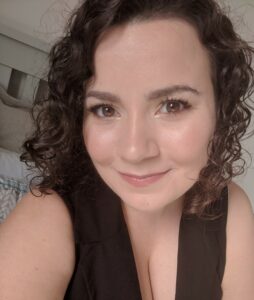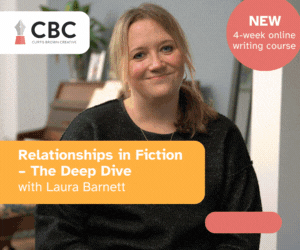Ask An Industry Expert: Hattie Grunewald
20 December 2019
Today I’m delighted to welcome Hattie Grunewald, former agent with Blake Friedman, now an agent with The Blair Partnership.
 Hello and welcome, Hattie. First of all, many congratulations on being short-listed for Agent of the Year in the RNA’s Industry Awards 2019 and on your new role with The Blair Partnership. Perhaps you could start by telling us about the new job?
Hello and welcome, Hattie. First of all, many congratulations on being short-listed for Agent of the Year in the RNA’s Industry Awards 2019 and on your new role with The Blair Partnership. Perhaps you could start by telling us about the new job?
The Blair Partnership is best known for their work with JK Rowling, though they also have a fantastic non-fiction list including Tyson Fury, Tom Watson and Chris Hoy, as well as some brilliant children’s fiction. I’ve joined the team to build our adult fiction offering, which is a really exciting opportunity – there’s a fantastic team here, and so many brilliant resources which I hope will launch and build the careers of some brilliant new fiction writers.
The Blair Partnership website lists quite a wide range of fiction genres and also some non-fiction. Where does romance fit in and how important is that category for the Partnership or for you personally?
Romance writers have formed a key cornerstone of my list from the very beginning of my career. When I was an assistant I worked with Carole Blake on writers like Sheila O’Flanagan, Liz Fenwick, Elizabeth Chadwick and Barbara Erskine. The first book I sold as an agent was a YA romance, and I now represent a significant number of romantic novelists. For me, I just love a love story! I get very invested in characters, and I love to feel emotionally connected to my books, and I find these are qualities you tend to find most often in romantic fiction. It’s also a perennially popular genre, so it just makes commercial sense too.
It was great to have you participate in the RNA Conference last July and I was one of many delegates in your Slush Pile Slam! session. it was both informative and challenging to note how you and two other publishing professionals romped through a succession of first pages of manuscripts submitted (anonymously) by delegates to come to an immediate judgment as to whether it was a YES or a NO. What makes you say YES, or at least want you to read on?
When I’m reading, there are two factors I’m looking for – a confident voice and a strong concept. In terms of voice, I’m looking for something that balances description, dialogue and action well, something I think you get better and better at the more you write and the more you read. I don’t like anything flowery or over-written, but there needs to be enough to root you in the world of the novel and catch your interest. In terms of concept, that’s much harder to define – but generally speaking, I’m hoping that the author will quickly establish a character with clear motivations, a challenge that they will have to overcome, or plant questions in the reader’s mind that they will need to keep reading to find an answer to.
The Partnership’s submission guidelines for fiction are to send a covering letter, the first thirty pages and a one page synopsis. In what order to you generally tackle these and which carries most weight?
I always start with the covering letter – it helps me get in the right headspace when I open the sample chapters. When you’re presented with writing with no context on what genre it is or what the story will be about, it’s much harder to like because your brain doesn’t know what to expect! You need the cover letter to give the kind of blurb and genre information that most readers get from a book cover. It also, sometimes, will tell me that a submission isn’t for me before I’ve even opened the attachments – for example, it’s in a genre I don’t represent, or the writer has made an unprofessional approach that signals it might be hard to work with them. After the cover letter I will read the sample chapters – as much of them as I need to in order to make my decision. I only really read the synopsis if I know I like the sample material, and want a sense of where the book is going before I request the full. The chapters are the most important, in that sense – in the end, I just have to love the writing!
Presumably, as an agent, it is not enough to like a submission, you have to be confident sufficient other readers will like it to make it a commercial success. How do you go about judging the commercial viability of a new submission, in whatever category, bearing in mind what we sometimes hear of best-selling authors whose first hit initially got turned down?
I meet editors and other industry colleagues regularly and pay attention to the bestseller charts, so that I have a general sense of what’s selling well and people are looking for. That does inform my reading of submissions, particularly at the more commercial end of the market. That said – if I like something, sometimes that’s enough, particularly if my colleagues also like it. I have to have faith in my own tastes, and know that if I like something, probably someone else will too. And only by having that faith can I deal with the second part of your question – that fear that I’m going to pass up a potential bestseller. It’s two sides of the same coin – if I know that my own tastes are more important than the market, it doesn’t bother me so much that I might be missing out on something good… I can remind myself that I probably just wasn’t the right agent for it.
Diversity and inclusion are high on the agenda for the RNA, as for many other organisations. I wonder how The Blair Partnership’s selection of books and authors reflects these principles?
The Blair Partnership has always had such a diverse list of non-fiction clients and voices from all over the world – and it’s a high priority for me to maintain that balance when it comes to the fiction list we build here too. We regularly discuss how to broaden the range of submissions we receive and how to make ourselves accessible as an agency to the widest range of writers possible. I think when it comes to commercial fiction in particular, we need to be more representative of a wider variety of experiences – simply because it sells more books if people see themselves reflected in them!
Do you look for anything in an author apart from a brilliant book? (such as social media presence)
I don’t worry too much about social media presence or profile when it comes to fiction, though of course all those things can be helpful when it comes to selling books. Much more important to me is an author who is professional about writing, who is committed and dedicated to their craft, who is receptive to feedback, and who is prepared to build a trusting and open working relationship with me – those qualities make a much bigger difference to a long-term writing career than what you do on twitter.
Perhaps I could finish by asking you a little about yourself. I believe you have a degree in English and Creative Writing and write poetry. Do you ever wish you were sitting on the other side of the desk?
One of the main things my degree taught me was that I probably didn’t have what it took to make a career as a writer – the pressure of having to write regularly and the constant evaluation by my peers and tutors really dampened my creative spark. Hopefully I’m a bit more resilient these days than I was then, but I’m also in awe of how my authors come up with so many ideas and stick with them long enough for them to become books. I’m not ruling out ever writing a book myself – I still write a lot, and I can’t imagine giving that up – but when I daydream these days, I’m far more likely to be imagining my authors at the top of the bestseller charts than myself!
What do you like to read when not dealing with submissions? (if you have time!)
I read a pretty wide variety of stuff – you hear about great books all the time when you work in publishing so I always have a pretty large TBR pile. I love psychological thrillers and contemporary YA when I really want to unwind. I also listen to audiobooks all the time – often non-fiction, but that’s also how I read a lot of the bigger, chunkier novels that I can’t make time for during my usual working life.
What’s your proudest achievement?
Being shortlisted for agent of the year by the RNA of course! Thank you so much for all your support, and for having me back to your blog.
Many thanks for talking with us today, Hattie. For more about her work at the Blair Partnership see:
Twitter: @hatteatime
Website: https://www.theblairpartnership.com/our_people/hattie-grunewald-literary-agent/
*
Hattie was talking with Susan Leona Fisher: http://www.SLFisherAuthor.co.uk




